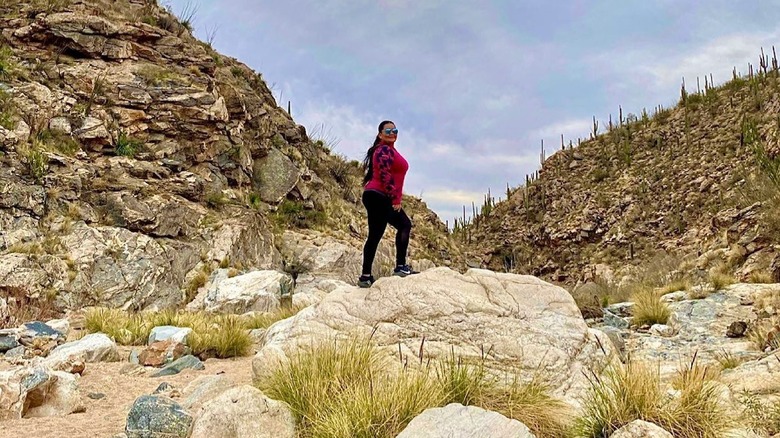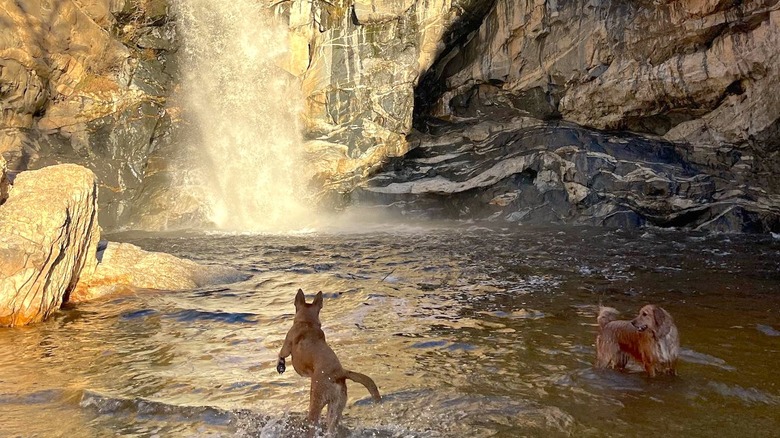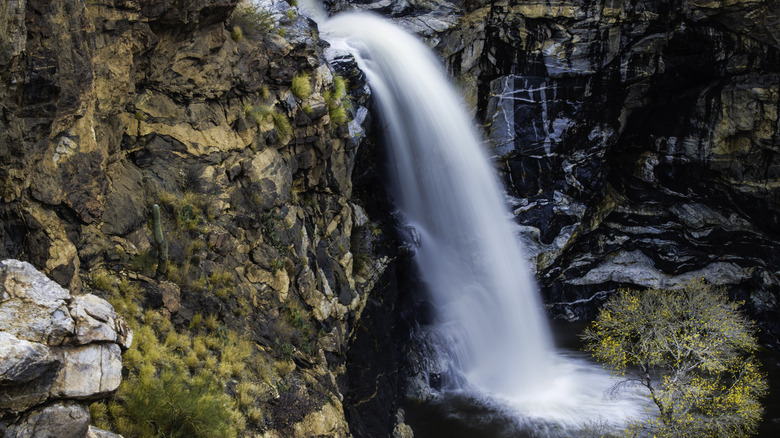Tanque Verde Falls just outside of Tucson, Arizona, is a striking display of nature: a magnificent 80-foot cascade of water in the middle of the freakin’ desert. But this natural wonder is not meant for everyone’s eyes. To see it, you’ll need to make an Indiana Jones-style trek two miles up a rough riverbed strewn with giant boulders.
The route can be slippery and difficult to follow at times, requiring proper footwear and and careful navigation. You’ll also need some arm strength to pull yourself up over some huge rocks. With its exceptionally rough terrain, the path is kind of like a cactus-studded obstacle course with an incredible reward waiting for you at the end.
The desert environment presents its own set of challenges, such as prickly plants, intense sunlight, and limited shade. Depending on the time of year, there’s also the possibility of extreme heat. Moreover, hikers should be extremely cautious of hiking in this area anytime thunderstorms are imminent due to the potential for deadly flash floods. Given these risks, Tanque Verde Falls hike is an adventure that demands a bit of respect and preparation.
Conquering the Tanque Verde Falls Trail

asdzaan_floetry / Instagram
Get an early start to avoid hiking in the hottest part of the day and also because the trailhead parking lot fills up quickly on weekends and holidays.To reach the Tanque Verde Falls trailhead, take Tanque Verde Road east from Tucson until it becomes Redington Road. While a 4x4would be ideal here, you can drive the last half mile of dirt road with a normal vehicle; just take it slowly. You’ll then see signs for the Tanque Verde Falls trailhead; park in the nearby dirt parking lot.
The first half mile of the trail switchbacks down a lovely stretch of desert dotted with saguaros and other kinds of cacti, mesquite and Palo Verde trees, and wildflowers in spring (if you’re lucky). When you arrive at the wash, head left and follow the riverbed up the canyon, past a number of baby waterfalls and natural pools. The latter become refreshing swimming holes full of sparkling clear water in the right weather conditions, so feel free to jump in if and when you feel like it. After about .75 miles, whip out those boulder-scrambling skills to get to your first real cascade. This one is an impressive 30-feet tall but only an appetizer. Scramble up the rock on the right side of the junior waterfall to feast your eyes on the main course.
Other helpful tips and information

taylor.pavlu_/ Instagram
Have a blast splashing and swimming in the beautiful pool below the waterfall, but please be careful, as the granite is super slippery and the current can be strong. When you’re ready to go, return the way you came, and follow the Leave No Trace Principles, taking all your belongings and garbage with you. Here are a few other things to keep in mind to stay safe and comfortable during this amazing adventure. The best time of year to hike to the falls is in the cooler months from October through April. Avoid the canyon in summer, when it turns into an actual oven. Whatever season you do this hike, though, be prepared for harsh arid desert conditions by wearing ample sunscreen and carrying more water than you think you’ll need.
In addition, this is a hike where having the right (or wrong) footwear can make (or break) your trip. The route is rugged, wet, and slippery, meaning you need water-suitable shoes that provide excellent traction and support. Specialized water shoes or water sandals with tight straps (not flip flops) could be a good choice because they won’t come off in the current. If you prefer traditional hiking shoes or boots, understand that they may get wet and soggy, and definitely bring an extra pair of socks.

